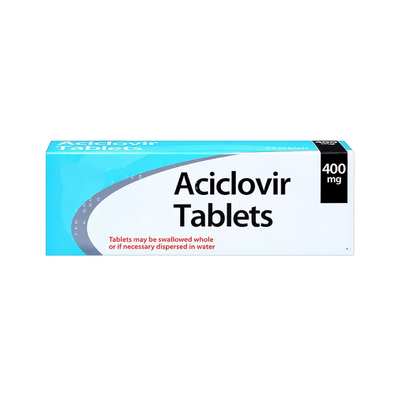Aciclovir Tablets
- Anti-viral
- Cream and oral tablet
- Prescribed by UK pharmacists
Aciclovir Tablets
Category:Cold SoreSay Goodbye to Flare-Ups with Aciclovir
Aciclovir tablets are a prescription-based, sure-shot treatment for Genital Herpes. The antiviral medication treats and suppresses flare-ups. The pack comes in 400mg and 800mg. It is prescribed to take medicines every day. If you buy Aciclovir 400mg tablets, then you need to complete the entire course in 5 days. Besides, if you buy Aciclovir 800mg, it will only require 2 days to complete the entire course.
Medication Features:
- Proven Treatment: For Genital Herpes
- Onset of Action: Starts working within 12 Hours
- Age Recommendations: Suitable for all Ages
- Dosage Guidance: 5-day course of Aciclovir 400mg Tablets & 2-day course of Aciclovir 800mg
- Dosage Type: Oral Tablets
- Active Ingredient: Aciclovir
Fetching Data...
All inclusive services
No extra costs
Free tracked delivery
Delivered in plain packaging
Prescription included
No consultation charges
More Information Before You Buy Aciclovir Tablets
- Generic Name: Aciclovir
Indication
Aciclovir is a fast-acting antiviral medication that effectively treats herpes simplex and varicella-zoster viruses. It eliminates the virus from the body when the entire dose is taken. Buy Aciclovir tablets online now in the UK to get rid of this highly contagious virus.
Mechanism of Action
Acyclovir works by inhibiting the replication of the herpes virus. The viral enzyme thymidine kinase converts it to acyclovir triphosphate (ACV-TP). ACV-TP then interferes with the viral DNA polymerase, preventing the virus from making new copies of itself.
Dosage and Administration
- Chickenpox and Shingles: 5 times daily for 7 days
- Genital Herpes: 5 times daily for 5 days
- Oral Herpes: 5 times daily for 5-10 days
- Prevention of Genital Herpes Recurrences: Twice a Day for 6-12 Months
Efficacy
Aciclovir tablets effectively treat HSV and VZV infections, relieving symptoms and gradually promoting recovery.
Side Effects
Unlike other tablets, this has common side effects like diarrhea, nausea, vomiting, headache, fatigue, and dizziness.
Contraindications
Aciclovir tablets should not be taken by people allergic to aciclovir or valacyclovir. Do not buy Aciclovir tablets if you notice any bumps or allergic reactions.
Directions
- Take Aciclovir at the same time each day.
- Take the dose of aciclovir immediately in case you have missed one.
- If it's time for the next dose, continue as per the regular schedule.
- Take three tablets daily of Aciclovir 400mg for five days.
- Complete the course even after fully recovering.
Frequently Asked Questions for Aciclovir Tablets
Can I purchase Aciclovir tablets over the counter in the UK?
No, Aciclovir is a prescription-based drug in the UK, and it cannot be obtained over the counter. However, you can purchase Aciclovir tablets online from a licensed medicine provider.
What should I do if I miss a dose of Aciclovir?
Do not double your dose if you miss the scheduled one. Instead, continue with your regular dosing schedule as prescribed by your doctor.
What precautions should I take during Aciclovir medication?
While on Aciclovir, refrain from engaging in sexual activity, as the herpes virus is contagious through skin-to-skin contact. Avoid sexual intercourse until you have completed the prescribed medication or have fully recovered.
Where can I buy Aciclovir tablets?
Since this medication is a prescription-only medication for genital herpes, you can buy Aciclovir tablets online from a verified pharmacy store.
